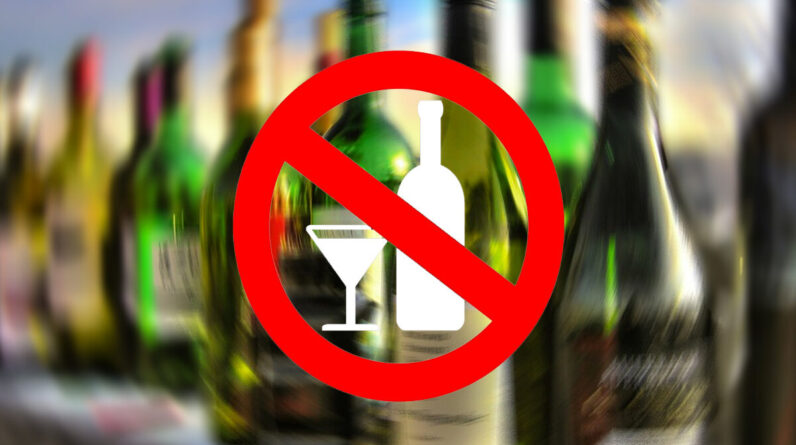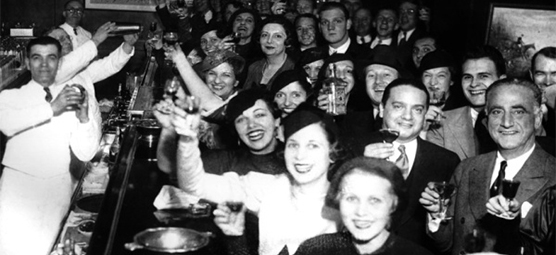
Prohibition Remembrance Day is an annual observance honoring the commemoration of the end of the prohibition era in the United States, celebrated on December 5th. This day reminds us of the historical period from 1920 to 1933 when the production, sale, and distribution of alcoholic beverages were prohibited.
The purpose of this writing is to shed light on the significance of Prohibition Remembrance Day and the impact it had on American society. During this time, the nation experienced a rise in organized crime, the creation of speakeasies, and a shift in societal attitudes towards alcohol consumption.
Join us as we delve into the history, causes, and consequences of the Prohibition era, and explore how it shaped the future of the United States.
The History Of Prohibition
The era of Prohibition, spanning from 1920 to 1933, holds significant historical importance and continues to be remembered through events like Prohibition Remembrance Day. This period in American history was marked by a ban on the production, sale, and distribution of alcoholic beverages. The implementation of Prohibition was influenced by various factors, including concerns over public health, the influence of temperance movements, and moral and religious beliefs. The Prohibition timeline provides a brief overview of key events during this period, such as the ratification of the 18th Amendment, the rise of illegal alcohol production and distribution, and the eventual repeal of Prohibition with the 21st Amendment. Through Prohibition Remembrance Day, we reflect on the circumstances and consequences of this historic era, highlighting the impact it had on American society and culture.
The Impact And Legacy Of Prohibition
Prohibition, also known as the Noble Experiment, was a nationwide constitutional ban on the production, sale, and distribution of alcoholic beverages in the United States from 1920 to 1933. This period had lasting effects on both society and the economy.
One of the major effects of Prohibition was the rise of bootlegging and organized crime. The illegal production and sale of alcohol became a lucrative business, paving the way for gangsters like Al Capone. Speakeasies, secret establishments where alcohol was served, became popular, undermining the intent of the law.
Furthermore, Prohibition caused a shift in public sentiment over time. Initially, it was seen as a way to promote moral values and reduce crime. However, public opinion began to wane as enforcement became increasingly difficult and corruption within law enforcement and government officials was exposed.
On Prohibition Remembrance Day, it is important to reflect on the impact and legacy of this historic era. The consequences of Prohibition on society and the economy are still felt today, making it a significant chapter in American history.
Prohibition Remembrance Day: Commemorating The End
Prohibition Remembrance Day holds great significance as a commemoration of the end of the Prohibition era in the United States. This day serves as a reminder of the strict ban on the production, sale, and transportation of alcoholic beverages from 1920 to 1933. The event allows us to reflect on the historical events and milestones that eventually led to the lifting of the Prohibition, including the rise of organized crime, the influential activism of women’s suffrage movements, and the economic impact of the Great Depression. It is observed with various celebratory traditions and activities, such as historical reenactments, museum exhibits, and educational programs highlighting the cultural and societal changes brought about by the end of Prohibition. This day serves as a reminder of the importance of individual rights and the power of collective action in shaping our society.
Significance Of Prohibition Remembrance Day
Prohibition Remembrance Day holds immense significance as it reminds us of the era when the production and sale of alcoholic beverages were strictly prohibited in the United States. It serves as a reminder of the significant historical events and milestones that ultimately led to the end of Prohibition. This day allows us to reflect on the rise of organized crime, the influential activism of women’s suffrage movements, and the economic impact of the Great Depression. By commemorating Prohibition Remembrance Day, we acknowledge the power of collective action and recognize the cultural and societal changes that occurred after the repeal of the 18th Amendment. Celebratory traditions and activities associated with this day, such as historical reenactments and museum exhibits, help us understand the impact of Prohibition on our society and appreciate the importance of individual rights and freedoms.
Prohibition Remembrance Day Celebrations: Past And Present
Prohibition Remembrance Day is a significant event that commemorates the end of the Prohibition era in the United States. Each year on this day, people gather to remember the impact and consequences of Prohibition and to celebrate the freedom to enjoy alcohol responsibly.
The past Prohibition Remembrance Day celebrations have been characterized by various activities and events. These include historical reenactments, educational exhibits, and lectures that highlight the social, cultural, and economic aspects of the Prohibition era. People come together to learn about the history of Prohibition and its effects on society.
Across different parts of the country, the day is celebrated in unique ways. Some communities organize themed parties that recreate the atmosphere of the Roaring Twenties, complete with jazz music, flapper costumes, and vintage cocktails. Others may hold craft beer festivals or wine tastings to appreciate the art of brewing and local winemaking.
In the modern-day, there are various events and initiatives that honor the end of Prohibition. These can include fundraisers for organizations working towards alcohol awareness, responsible drinking campaigns, and historical exhibitions at museums. The goal is to foster a responsible drinking culture while acknowledging the significance of the past.
Prohibition Remembrance Day: Educating And Raising Awareness
The annual Prohibition Remembrance Day provides an opportunity to educate and raise awareness about this crucial time in American history. It is important to educate the public about Prohibition and its impact, as it shaped society and had lasting consequences. Museums, exhibits, and educational programs play a vital role in this effort. These institutions help preserve the history and provide a space for people to learn about the rise and fall of Prohibition. They showcase artifacts, documents, and stories that reflect the era, allowing visitors to delve into its complexities. Additionally, efforts are made to raise awareness about the lessons learned from Prohibition. This includes highlighting the negative impact of alcohol abuse, the significance of responsible drinking, and the need for effective policies to address alcohol-related issues. By commemorating Prohibition Remembrance Day, we aim to honor our past, learn from it, and create a better future.
Acknowledging The Repeal: Prohibition Remembrance Day Parades
In celebration of Prohibition Remembrance Day, parades take place to acknowledge the repeal of the Prohibition era. These parades provide an opportunity to reflect on the historical significance of this event and its impact on society.
Throughout history, notable parades have taken place to commemorate Prohibition Remembrance Day. These parades not only serve as a reminder of the importance of individual rights and freedoms, but also showcase the resilience and determination of communities.
The elements and features of these parades vary, but they often include lively music, colorful floats, and participants dressed in period costumes. The parades aim to recreate the spirit of the Prohibition era, allowing attendees to step back in time and gain a deeper understanding of the struggles and triumphs of those who lived through it.
Prohibition Remembrance Day parades offer a unique opportunity to educate and engage the public in an immersive and interactive experience. By attending these parades, individuals can gain a greater appreciation for the significance of Prohibition and its lasting impact on American society.
Prohibition Remembrance Day Cocktails: Celebrating Culture And Creativity
Prohibition Remembrance Day is a time to reflect on the impact of the Prohibition era and celebrate the resiliency of the people who found creative ways to enjoy themselves despite the ban on alcohol. Cocktails played a significant role during this time, as they allowed individuals to mask the taste of bootlegged liquor and provided a sense of sophistication and rebellion. Classic cocktails such as the Old Fashioned, Bee’s Knees, and Sidecar became popular during Prohibition and are still enjoyed today for their historical significance and timeless taste. Additionally, modern mixologists have put their own twists on Prohibition-inspired cocktails, infusing them with innovative flavors and techniques. From smoked-infused bourbons to unique garnishes, these updated cocktails pay homage to the creativity that emerged during this tumultuous period in history. So, on Prohibition Remembrance Day, raise a glass and toast to the enduring legacy of cocktails and the resilient spirit they represent.
Prohibition Remembrance Day Events: Engaging The Community
The commemoration of Prohibition Remembrance Day is not just a date on the calendar; it is an opportunity for the community to come together and reflect on our history. Community events and activities play a pivotal role in fostering a sense of togetherness and remembrance.
Collaborations with local businesses, organizations, and schools have been instrumental in organizing engaging events. By partnering with these entities, we are able to create a diverse range of activities that appeal to people of all ages and interests. From historical tours to exhibitions and interactive workshops, the events provide educational and entertaining experiences.
Encouraging public participation and involvement is key to the success of Prohibition Remembrance Day. Through community-driven initiatives, such as art competitions, storytelling sessions, and community clean-ups, we aim to actively involve individuals in the remembrance process. These activities not only bring people together but also create a strong sense of ownership and pride in our shared history.
Prohibition Remembrance Day: Reflecting On Lessons Learned
Prohibition Remembrance Day is an opportunity to reflect on the lessons learned from the Prohibition era. This time in American history, from 1920 to 1933, when the sale, production, and distribution of alcoholic beverages were banned, had lasting impacts on alcohol laws and regulations. One important lesson is the recognition that outright bans often lead to unintended consequences, such as the rise of organized crime and illegal activities.
Alcohol regulations today are influenced by the Prohibition experience, with a focus on balancing public health and safety concerns with personal freedoms. This includes age restrictions, licensing requirements, and restrictions on certain types of alcohol-related activities. Remembering and reflecting on Prohibition helps us appreciate the delicate balance required in regulating alcohol consumption and reminds us of the importance of thoughtful policy-making.
Celebrating Freedom: Prohibition Remembrance Day Festivities
Prohibition Remembrance Day is an important occasion that allows us to celebrate the freedom we have today. This day holds cultural and historical significance, reminding us of the period when alcohol was prohibited in the United States. The festivities organized for Prohibition Remembrance Day give us the opportunity to come together and honor our ability to make choices.
Music and entertainment play a major role during the Prohibition Remembrance Day celebrations. We can enjoy live performances by talented musicians who bring us back to the era through their retro sounds. The vibrant and energetic atmosphere is enhanced by various forms of entertainment, including dance performances and theatrical shows. These activities not only entertain but also educate us about the struggles faced by our ancestors during the Prohibition era.

Credit: themobmuseum.org
Frequently Asked Questions Of Prohibition Remembrance Day
What Day Did Alcohol Become Illegal?
Alcohol became illegal in the United States on January 17, 1920, under the Prohibition Amendment.
What Happens To The Prohibition On December 5 1933?
Prohibition ended on December 5, 1933, allowing the legal sale and consumption of alcohol in the United States.
What Was The Prohibition In The Roaring 20s?
The prohibition in the Roaring 20s was a nationwide ban on the production, sale, and transportation of alcoholic beverages in the United States. It lasted from 1920 to 1933 and was an attempt to reduce crime and social problems associated with alcohol consumption.
What Is The Prohibition In Ww1?
The prohibition in WW1 was a movement to ban the production, sale, and consumption of alcoholic beverages in many countries during the war. It aimed to conserve resources and maintain discipline among soldiers, but it also had social and economic impacts.
Conclusion
As we commemorate Prohibition Remembrance Day, let us reflect on the lessons learned from this significant period in history. It serves as a reminder of the consequences that arise from attempting to restrict the consumption of alcohol. The impact of Prohibition on society, the rise of organized crime, and the eventual repeal highlight the importance of balance and thoughtful regulation.
History has taught us that our choices should be guided by understanding rather than an outright ban. Let us remember this day as a reminder to approach social issues holistically and seek meaningful solutions.






